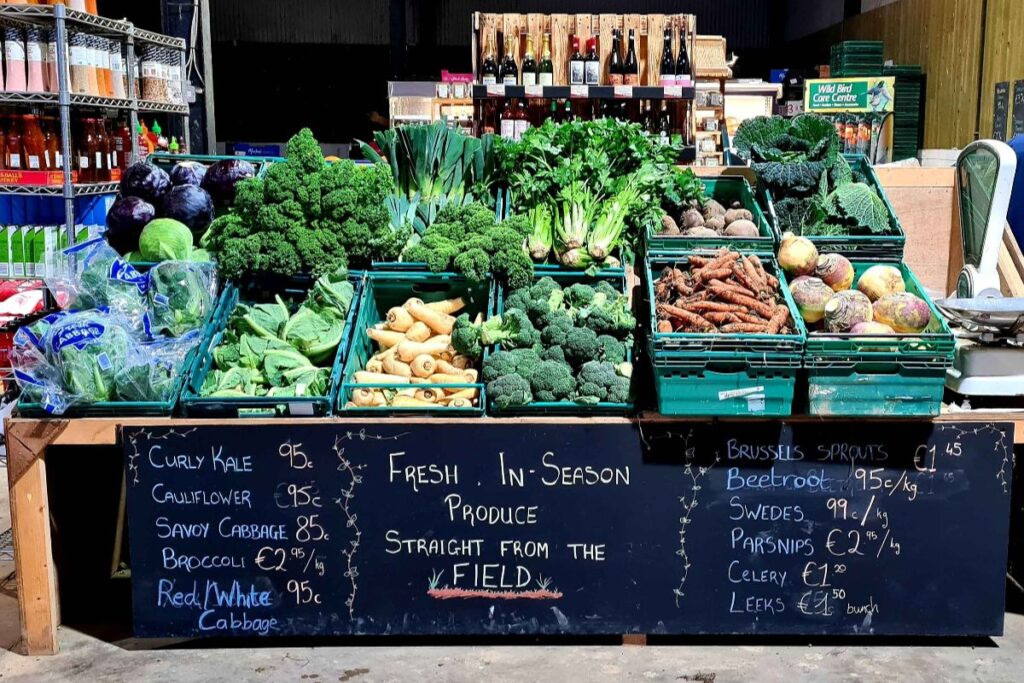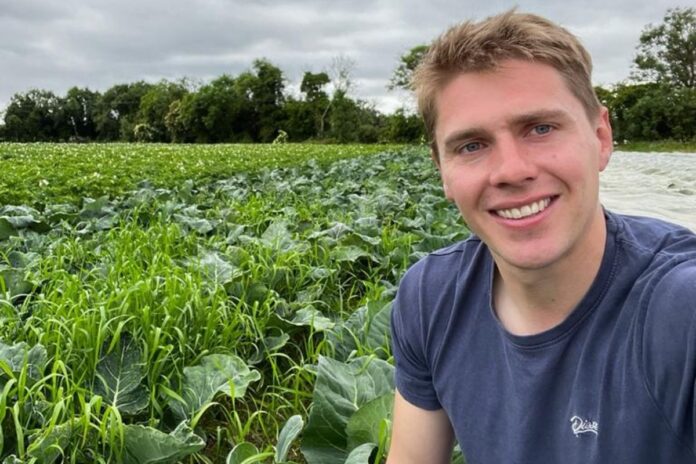That’s Farming editor, Catherina Cunnane, in conversation with Andrew Ruiter (34), Donaghmore, Ashbourne, County Meath, of Newbarn Farm, in this week’s Farmer Focus segment.
“I am the second generation on this particular farm, which my father, William, owns.
I have a BSc in Horticulture from ITB/Botanic Gardens, which I completed in 2010, and I have previously worked for Keelings in its state-of-the-art pepper glass house.
Now, I am based at our 24-acre Newbarn Farm (farm shop, restaurant and open farm), which I run alongside my father, and we have two full-time employees on the farm: one on the farm and one in our farm shop.
We also have 2-3 part-time staff to help at weekends and harvest over the summer, in addition to circa 15-18 staff employed in the restaurant.
Once the restaurant was opened on the family farm in the summer of 2011, I returned to work at home following a stint of off-farm employment.
Everyone has different jobs to carry out over the seasons, given the nature of our food crop enterprise.
Newbarn Farm
The classic case of our business started from a much larger farm. My father, William Ruiter, grew around 80 acres plus of leeks and broccoli for Quinsworth, later Tesco, but in the late 1990s, he had a choice to either double his output or downsize if he wanted to survive.
We relocated to Ashbourne, and in 2003, the shop opened, which was subsidised by selling broccoli leeks and cabbage into the Dublin Market and then 2011, the restaurant opened its doors.
The farm is based on a very basic layout. The first shed, as you enter, is the shop area, which takes up the entire shed. Beside that is the machinery/storage shed, and directly across is the restaurant. Then, we have small, open-faced sheds for animals around the animal farm.
Our mantra is GLAS:
- Go with the season;
- Use Local produce;
- Avoid food waste;
- Use Sustainable practices.
We grow a wide variety of brassicas (broccoli, york cabbage. red/white cabbage, sprouts, kale, cauliflower, and swedes), Queen potatoes, onions, leeks, scallions, broad beans, pumpkins, courgettes, beetroot and carrots.
We grow to sell in our shop and use in our restaurant and sell any surplus/excess to a supplier.
Moreover, we also buy strawberries, tomatoes and other seasonal vegetables from local farmers around the area.
So, how did we get our name? The shed was originally built in 2000, and the family home was built after.
When giving directions to the place for builders, it was always referred to as the new barn on the N2. As for the Donkey Shed Restaurant, we literally kept donkeys in that shed before it was converted into a restaurant.
Responsibilities
I am involved in the day-to-day running of the business farm, shop, restaurant and animal farm.
However, my main tasks are importing, buying stock for the farm shop setting out the planting plans for the year, and everything involved in bringing crops to harvest.
Jobs change day-to-day over the season, but an average day is to go open up the shop/restaurant, collect any produce/stock needed for the restaurant and join whoever is in the field to help gather veg for the shop.
After lunch, it is usually tractor work ranging from ploughing to planting – depending on the time of year.
I finish the day by seeing what stock is needed for the next day in the shop and ordering or organising whatever is needed for the next day.
I would say I am a full-time farmer, but the business steers more towards the agri-business end of things.
Personally, I have never been interested in anything other than farming and have only worked on farms.
I enjoy being outside and the reward of growing. Being able to see my product going from farm to fork on-site with the restaurant is brilliant.
Every season you learn something new or face a new challenge with growing.
Also, having the farm shop on-site means you see your customers, and when they come specifically for our own spuds or veg is brilliant.

Challenges
I find weather changes over the last few years are becoming more challenging. An example was last April, May and June; there was zero rainfall and below-average temperatures, which meant growth was slow, even with irrigation.
Then, suddenly, we had a heat wave, and everything came in together, which meant we had three squares of broccoli to cut at the same time, which left us with far too much excess produce.
But with challenges, usually, there is a simple fix to things you can fix by asking for help.
At the moment, the cost of living crisis with the price of fuel, fertiliser, chemicals and labour is the biggest challenge.
It feels like every week, you have to adjust pricing or costs due to the market being so volatile at the moment.
But sometimes, you can turn what may initially seem like a challenge into an opportunity, and that is particularly true in the case of the Covid-19 pandemic’s impact on our business.
The openness of our building and our walk around the animal farm attracted a lot of new customers because they felt safe in the fresh air, and feeding the animals got them out of the house for a little while.
Also, even though the restaurant was closed, we were able to invest in upgrades thanks to grant support from the government.
Mission statement
Our mission statement is to produce home-grown or locally produced food to the local area and to attempt to always push what is currently in season
Our enterprise is viable as it is an agri-business rather than a conventional farm. It makes it possible to make a living, but if the restaurant or shop were not on-site, that would not be so.
We are different because there are very few places you see the ingredients for your dinner or the items in the salad you ordered come into the shop freshly cut off the trailer.
People know what they are getting, which in our case, can be carefully home-grown or locally sourced fruit and veg.
Future
Currently, we are trying to future-proof our business and will be installing solar panels soon to reduce energy costs.
Then, we look at getting an electric van to try and reduce costs over time, in line with our recent solar panel installation.
Hopefully, in the coming years, we will have built on the Newbarn brand and have increased our customer base.
What makes our agri-business unique is we are fully invested in the shop and restaurant.
They are not there to subsidise extra income on the farm; they are the farm, so all our energy goes into making them work.
We also work very hard on adapting and changing how we do business, as we are always trying to find ways to be more efficient and cut costs.
One such way is now that we import out-of-season and exotic fruits veg straight from Holland, which cuts out a middle, meaning we get our produce faster and fresher and with less handling and transport on them.
The future of agriculture in Ireland, in my view, is bleak with the squeeze that is been put on growers by the supermarkets.
Supermarkets’ insistence on selling fruit and veg at below cost is going to force more farmers to leave the industry and will, in the long run, destroy our country’s food security.”
To share your story, email – [email protected]





